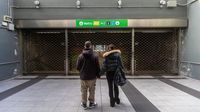Millions of commuters across Italy are bracing for significant disruptions as a national public transport strike is set to commence on March 21, 2025. This strike, organized by unions including Cobas Lavoro Privato, Adl Cobas, Sgb, and Cub Trasporti, will run for 24 hours and will impact bus, metro, and tram services in major cities including Milan and Rome.
The impetus for the strike revolves around several core demands from the unions. Chief among them is the call for a €300 salary increase for workers in the public transport sector. Additionally, the unions are pushing for a reduction in the working week from 39 to 35 hours, improved health and safety standards, and a halt to privatization efforts that threaten jobs and service quality.
In Milan, the strike will disrupt ATM services with significant interruptions expected from 8:45 AM to 3 PM and again from 6 PM until the end of service. The city's metro, trams, and buses will be greatly affected, and while earlier in the day services may run normally, commuters are advised to prepare for delays and cancellations later. Already, ATM has prepared users for potential frustrations in ticket offices and information points, as staff levels are likely to be reduced.
Meanwhile, in Rome, the strike will affect the entire ATAC network, making it even more challenging for commuters. Services will not run from 8:30 AM to 5 PM and then again from 8 PM to the end of service. Similar to Milan, the strike also impacts nearby regional transport services, and disruptions are expected to extend into the night and the following morning for some passengers.
Other cities are also bracing for their share of suffering. In Naples, for example, staff at Busitalia Campania will abstain from work with service guarantee times between 6:30 AM and 9 AM, and 1 PM to 4:30 PM. Torino's GTT service will see interruptions from 9 AM to noon and from 3 PM to close, while Tper services in Bologna and Ferrara will be halted from 8:30 AM to 4:30 PM and again from 7:30 PM onwards.
Florence is preparing for possible tram delays and cancellations, particularly between 6:30 AM and 9:30 AM, and again from 5 PM to 8 PM. Further, in Genoa, a four-hour strike has been announced, while Venice may face disruptions in both urban and extra-urban transport services.
This strike comes on the heels of another transportation disruption only days earlier. On March 19, there was a strike among train workers that covered Trenord, Trenitalia, and high-speed trains, which operated normally during the public transport strike. This means that commuters relying on both rail and local transport should be particularly attentive to service schedules in the coming days.
Union leaders have called this a necessary protest to secure a fairer workplace, highlighting concerns over government spending priorities. "We do not want your contract and we do not want your war," said a spokesperson from Al Cobas, referring to what they perceive as a diversion of resources from essential public services to military spending.
The unions are wary after government announcements regarding increased fuel duties and cuts to national transport funding. They argue that this leads to higher fares for the citizens reliant on these essential services.
For travelers, recommendations to mitigate disruptions include checking service guarantee schedules and considering alternative modes of transport such as bicycles or car-sharing options. Officials encourage commuters to stay informed through official transport websites for real-time updates and any last-minute changes.
Looking beyond March 21, the unions have indicated that further actions are possible, signaling a tumultuous road ahead for Italy's public transport landscape. Indeed, the strike of March 21, 2025, stands as a critical point for both workers and commuters, reflecting the urgent need for dialogue around labor rights, pay, and the future of public transport services in the country.






